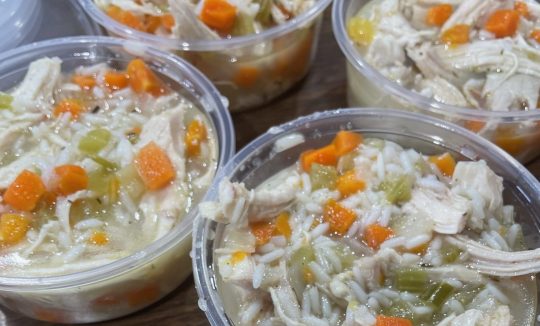Food Outreach and the Brown School at Washington University in St. Louis Collaborate to Study the Impact of Food is Medicine on Diabetes Care
Food Outreach has partnered with Dan Ferris, an assistant professor of practice at the Brown School at Washington University in St. Louis, to conduct a study to evaluate the effect of Food Outreach’s type II diabetes pilot program. Ferris’s study, titled “From Translation to Transformation: Medically Tailored Meals and Food-is-Medicine Approaches for Reducing Health Disparities in Diabetes Management,” aims to evaluate how a comprehensive Medically Tailored Meals program in St. Louis can improve outcomes for adults with type 2 diabetes.
Launched in 2022, Food Outreach’s pilot program enrolled over 150 participants in partnership with SSM Health and Mercy Health. Through Food Outreach’s program, participants with an HbA1C greater than 8.0% and living at or below 300% of the Federal Poverty Level received a comprehensive nutrition intervention centered around Medically Tailored Meals, nutritious groceries and fresh produce, and free Medical Nutrition Therapy by Food Outreach’s registered dietitians. All of Food Outreach’s services are provided at no charge to our clients. Recently, Ferris received a pilot and feasibility grant from WashU’s Center for Diabetes Translation Research (WU-CDTR) to study the impact of nutrition and Food is Medicine programs on diabetes care.
Katie Simpson, Director of Program Initiatives, is part of the team running the program at Food Outreach. “Food Outreach is excited to work with Dan Ferris and Washington University to determine the impact of our Medically Tailored Meal program and nutrition supporting interventions on clinical outcomes, disease management, nutrition and food insecurity, and quality of life. We know there is power in food is medicine interventions and are grateful for the WU-CDTR grant that makes this evaluation possible.”
Food Outreach staff and Ferris will collaborate with a study team including Sarah Moreland-Russell, associate professor of practice and Stephen Roll, assistant professor, to analyze the impact and implementation of the meals program through surveys, health data, and participant interviews.
The study seeks to address gaps in policy, cost-effectiveness, and implementation science for community-based, healthcare system-partnered nutrition programs. Diabetes was the eighth leading cause of death in Missouri in 2023, and across the U.S. This chronic disease occurs when the body’s ability to produce the hormone insulin is compromised, leading to elevated blood sugar levels.
“Food is Medicine programs like Medically Tailored Meals have long supported individuals experiencing health conditions with deep connectivity to nutrition access,” Ferris said. “As U.S. policy, practice, and research move rapidly around community-level investments in social determinants of health, the WU-CDTR grant makes possible this partnership with Food Outreach to seed new insights into how programs like theirs can be replicated, improved, and expanded.”

